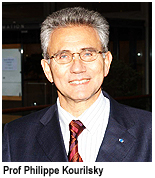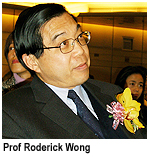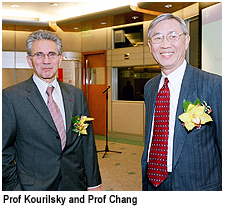Pasteur Institute President urges responsibility for global health care
Shiona Mackenzie
At 4:30 pm, CityU's Multi-Media Conference Room was filled with an audience of some 100 academics, special guests, students and members of the public, who enjoyed an introduction to the Lecture Series by Professor Roderick Wong, CityU's Dean of Research and Graduate Studies and Professor (Chair) of Mathematics.
Opening speeches by Professor H K Chang, President of City University of Hong Kong, Mr Serge Mostura, Consul General of France in Hong Kong and Professor Jean Dercourt, Permanent Secretary of the French Academy of Sciences and one of the world's leading experts in geology, touched upon the cultural and scholarly links between
Pay more attention to infectious diseases
Professor Kourilsky explained that in health care today, less than 10% of Research and Development (R&D) resources are devoted to the diseases that affect 90% of the world's population. "The economic impact of infectious diseases is huge in the developed world, as well as in developing countries. We have every reason, humanitarian or self-centered, economical or political, to pay more attention to infectious diseases," he pointed out. "The importance of infectious diseases has been underestimated in the developed countries, because people believe that modern medicine has brought them under control. However, AIDS, the bird flu and SARS proved that to be false." More than two billion people suffer from infectious diseases for which vaccines and drugs are not available, either because they are too expensive, or because they cannot be distributed adequately, or because they simply do not exist. "Contrary to popular thought, funding is not the only issue," he asserted. "Research, regulations and ethics also play a part in this unacceptable situation." The R&D pipelines, which could and should provide sufficient vaccines and drugs for such neglected diseases, face major difficulties.
So, what is to be done? According to Professor Kourilsky, a handful of measures can and should be undertaken quickly, not the least of which is raising awareness and generosity. Other recommendations he made included strengthening collaboration and supporting innovative partnerships, such as the Global Alliance for Vaccines and Immunization (GAVI), an alliance between the private and public sector committed to the mission of saving children's lives and protecting people's health through the widespread use of vaccines; the Drugs for Neglected Diseases initiative (DNDi); and focussing on the most cost-effective interventions and easy-to-use technologies, and tying funding to performance. "We should strengthen local structures and build bottom-up approaches," he maintains.
Professor Kourilsky is President of the world-renowned Pasteur Institute, in




